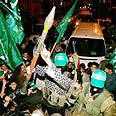
Hamas rally following elections victory
צילום: רויטרס
Life in the back seat
Hamas trying to enjoy political ride without assuming any responsibility
Sometimes riding in the back seat can be a good thing. It allows for the most fun without demanding even the slightest bit of responsibility. The draw to sit in the back is strong, for people and political entities alike.
That’s what Western Europe did during the Cold War: They let the United States take the wheel, while they sat in the back and watched their standards-of-living go up and up.
A new reality is being created in the Palestinian Authority, the most serious example of back-seat syndrome. There are not one, but two parties trying to jump in the back: Fatah and Hamas. There is someone sitting in the front, but they haven't got their hands on the wheel.
Economic siege?
Ehud Olmert's government has told the world it would cease transferring tax revenues collected on the PA's behalf as soon as there is a new Palestinian government. Even if the government is a professional one, Olmert told his counterparts around the world, it wouldn't change anything: As soon as the government gets its legitimacy from a Hamas-dominated parliament, as soon as it opens the security forces up to Hamas members, the tax agreements are null and void. Israel will not allow its money to be finance terrorist activity.
Israel demands Hamas recognize Israel, change its covenant and disarm. There is no chance these demands will be met. This can be proven both from public and private statements made by organization officials since the election. The only compromise they are willing to make is to sit in the back: to influence the goings=on in the Palestinian Authority without taking responsibility.
At the same time, Fatah is deep into terrorism. What Hamas is not doing at the moment, Fatah is. They are bitter at the election results. They are freed from responsibility. They laugh at Mahmoud Abbas' preaching. They were involved in terrorism for a year before the elections, too, but now they are going at it will all their might.
Netanyahu’s plan
Netanyahu warns that Hamas' victory will lead to an Iran-like state next door to, and inside, Israel. It will spread to Jordan and to Israel's Arab community. He proposes the IDF re-occupy large swaths of the West Bank, including the Jordan Valley, the Judean Desert and the hills overlooking Ben-Gurion Airport. He proposes including all these areas, about half the total territory of the West Bank, on the Israeli side of the security fence.
Even if his diagnosis is correct – and the issue is open for debate – his proposal is absurd. It would not only strengthen Hamas' hold on Palestinian and Muslim public opinion, It is highly questionable if he would have made the proposal were we not on the eve of elections, and were his party not expected to fall below 20 Knesset seats.
The government's preferred alternative – an Israeli and economic siege on the Palestinians – is not so simple. The Palestinians will be quick to play the humanitarian card. "They're starving us," they'll say to every microphone.
70,000 hungry cops
On the other hand, they will threaten to renew the terror campaign, and they will have 70,000 armed, hungry policemen at their disposal.
This is the chronic of a huge explosion, an explosion entirely predictable. Like a Greek tragedy, every player fills the role he was fated to: Hamas couldn't act any differently. Neither could Fatah. Neither could the Israeli government. Neither could the American government.
Everyone is standing at the brink. Everyone wants to take a step forward.
Against this background, maybe Russia's invitation to Hamas leaders isn't so terrible. The invitation flatters them, but it will also put them up against a mirror. If they can't provide for their people, they people might well vomit them out.
Hamas won these elections in both Gaza and the West Bank. Fatah carried two cities, Jenin and Qalqiliya. One Fatah leader explained why this happened: Both cities are run by Hamas mayors. They have installed religious coercion in recent months. No way, the voters said, and voted for Fatah.










